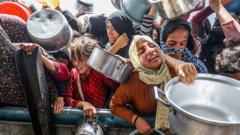As the conflict escalates, the UN's commissioner-general highlights the dire humanitarian crisis in Gaza, asserting that Israel's blockade is effectively weaponizing food security and risking famine for millions.
UN Official Calls Food Denial in Gaza a Weapon of War Amid Staggering Humanitarian Crisis

UN Official Calls Food Denial in Gaza a Weapon of War Amid Staggering Humanitarian Crisis
The UN's Palestinian refugee agency accuses Israel of using starvation as a tactic, warning that the Gaza population faces acute food insecurity.
How do you quantify human suffering? Journalists often rely on direct experience, but in the case of Gaza, where over 200 local reporters have lost their lives, the world is forced to piece together the humanitarian crisis from afar. According to Pascal Hundt, deputy director of operations at the International Committee of the Red Cross, Gaza's civilians are in a profound struggle: "An overwhelming daily struggle to survive." With Israel imposing a blockade that halts all humanitarian shipments, including food and medical supplies, the return to hostilities on March 18, after a two-month ceasefire, has intensified their plight.
Israeli Prime Minister Benjamin Netanyahu, facing pressure from ultra-nationalist factions that threaten his government, has initiated a new "intense" offensive, combining military assaults with plans to displace large numbers of Palestinian civilians. The UN's estimates indicate that close to 70% of Gaza is already off-limits for Palestinians, a dire situation exacerbated by the ongoing bombardments.
Philippe Lazzarini, commissioner-general of the UN agency for Palestinian refugees (UNRWA), voiced deep concern over the deteriorating conditions: "More than two months without any aid means starvation is spreading." He states that without immediate humanitarian relief, the population will face death not from violence but from lack of food—asserting that Israel's tactics seem to amount to the weaponization of humanitarian aid.
According to the Integrated Food Security Phase Classification, Gaza is nearing a famine status, with over two million residents experiencing acute food insecurity. The IPC report cites that 22% of the population is classified as facing "Phase 5 – catastrophe," indicating extreme levels of malnutrition and risk of death. The humanitarian supplies that could alleviate this suffering are just miles away in Egypt, yet remain blocked.
Mr. Lazzarini has unequivocally described Israel's actions as a potential war crime, emphasizing that this blockade is being utilized as a key strategy against Hamas. With growing accusations from some states leveling claims of genocide against Israel, the situation remains politically charged. Israeli officials publicly endorse the blockade as a tool for gaining leverage over Hamas, intensifying the fear and anxiety among families with hostages held in Gaza.
The internal divide in Israel reflects a broader international moral dilemma, as Netanyahu refuses to distinctly engage with accusations of war crimes while facing scrutiny over his government’s actions. As the humanitarian crisis unfolds, the international community is called to action—facing historical responsibility for allowing such atrocities to escalate unchecked.
The devastating consequences of this conflict hint at a grim future for both Israelis and Palestinians, as aspirations for peace slip further away. Mr. Lazzarini, reflecting on the escalating despair, warns that we are witnessing a massive atrocity unfolding—one that history may judge harshly if action is not taken soon. The situation in Gaza could lead to an enduring legacy of violence and displacement, rather than reconciliation and hope.



















